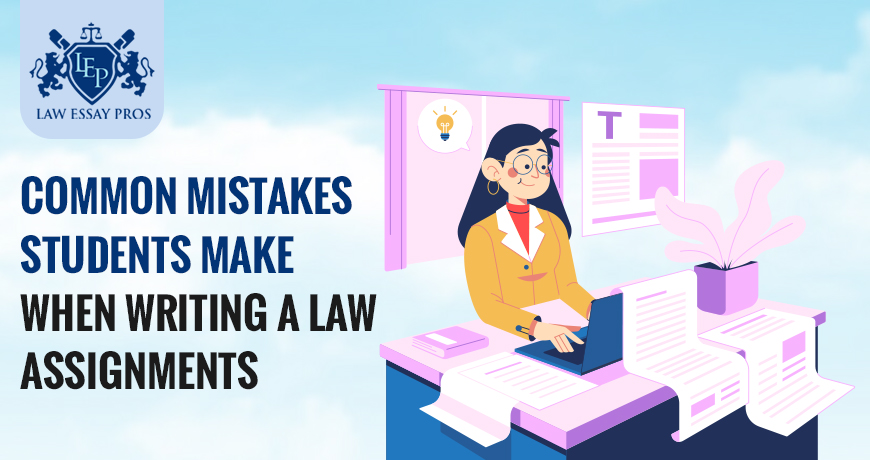
While most people assume writing term papers for law for the universities is simple, it is not, no matter what the law is. Writing law assignments is not just about understanding the subject matter extensively; it is more about reducing that knowledge into some learnable form. Being a field with a complex nature, the field of law requires critical thinking and high-quality research and application in order to produce high-quality papers. Many times, students struggle either with failing to understand the assignment requirements or with insufficient knowledge of the topic to address it properly.
If you find yourself facing a lot of problems, you may not be able to complete your law assignment on your own. The samples completed by law assignment writing services are completed by professionals with years of law coursework experience. These are samples for reference that can later be used during the development of your own assignments. Based on expert advice, here are some common mistakes students make while working on law assignments and how to avoid them.
To acquire help with law assignments, you can contact our law assignment expert UK writers from our website if you specifically need any help
Reading the Question Carelessly
One of the most common mistakes is failing to read and understand the assignment question thoroughly. Students don’t always have a full understanding of what is actually needed and rush into research or writing. Missing key elements or overemphasizing a single concept can happen this way. This can be avoided by spending time analyzing the question and figuring out which process terms (like "evaluate" or "discuss") the question is looking for, along with content areas. Take the time to look over any other instructions, academic outcomes, or research recommendations that might be part of the project. These are now guided resources for your work but don’t underestimate them.
Insufficient Research
Typically, law assignments require thorough and deep research. Missing this step leads to shallow work that doesn’t go into depth. Ultimately, the aim is to find out the topic’s key points from your lecture notes or from relevant online journals. If you've ever written an essay, then you’ll know that credible, peer-reviewed articles and journals are always your best bet, especially if they are within the past year and applicable to your assignment. However, do not depend too much on a single source, as it might appear as though your research is too little. It will show comprehensive understanding through a balanced use of multiple credible sources.
Skipping the Planning Stage
However, many students reduce the research writing process to a direct jump from the research writing stages without planning. Planning helps to lay out, at least, what your primary topics are, what your key points are, and what supporting examples you're going to use so that there's clarity and logic. Structure your essay using a checklist for introduction, body, and conclusion, and spend some of your word count on each. Rather, proper planning will save you the hassle of last-minute editing and deliver all your work integrated and well-structured.
Lack of Effective Knowledge
There are students who find it difficult to translate their understanding into clear, articulate writing. Write concise sentences and structured paragraphs, and then proofread rigorously if you have to show your knowledge. Double-check that your paper is neither far more than nor far less than the word count requirements. Underwriting might imply that you haven’t completed all your homework while overwriting will obscure your point. Equally important are proper citations, not only to give credit to the source authors but also to follow the academic standards and to avoid plagiarism.
The Solution: Relying on Repetition Instead of Critical Thinking
Mostly people repeat ideas in textbooks or research articles without analysis. However, it is necessary to reference relevant sources. Furthermore, this critical approach shows that you are thinking analytically and, importantly, that you are likely to be an able thinker when you are in the profession, and so is going to enhance the quality of your paper.
Neglecting the Bibliography
In law assignments, Including a bibliography is non-negotiable. It tells you who your sources are and makes sure they get credit for it. If it does not provide a complete bibliography, penalties may be applied, or the grade may be decreased. Always use the cited style specified and check that all the documented sources are valid.
Weak Conclusions
Another mistake many people are guilty of is not caring about the conclusion or adding unnecessary conclusions that are not fact-based. Your conclusion should knit up your argument, ideally printing an image in the reader’s mind that you can continue to explore in the class period to come. Don’t introduce any new ideas; keep it brief and to the point, and simply summarise what you discovered.
Final Thoughts
As you are about to discover, the mistakes outlined above are not only common but also very avoidable. Another way to learn from a well-drafted law assignment sample is to observe the structuring and argumentation if it’s clear to you. This could also help you to generate subject matter ideas if you are stuck. If you ever need some more assistance, it will be wise to look for some professional law assignment help. These experts are there for you 24/7 to help you in reaching the best result possible in your law project.